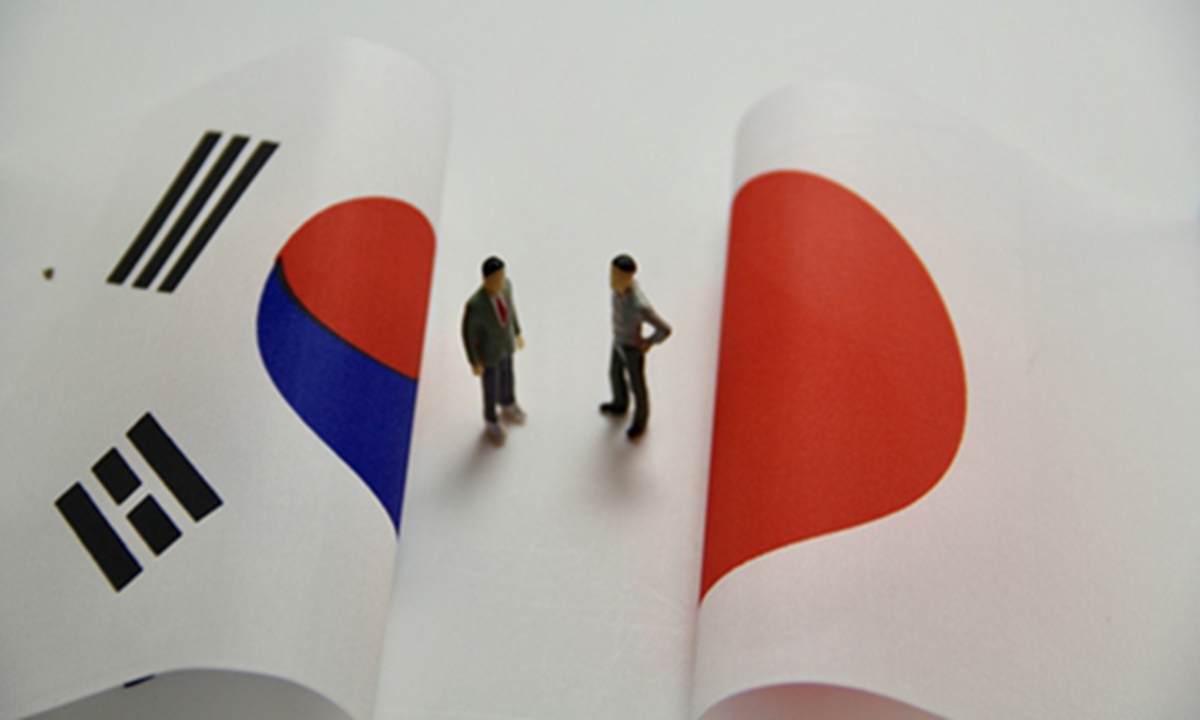
Photo: IC
South Korea's Defense Ministry published its 2020 Defense White Paper on Tuesday. South Korea made changes in descriptions of some of its neighboring countries including Japan and China. For example, South Korea described its relations with Japan as one of "close neighbors," in contrast to the previous white paper published two years ago that described the two countries as "geographically and culturally close neighbors as well as partners cooperating for global peace and prosperity"
The change shows that over the last two years, Seoul and Tokyo have become somewhat estranged from each other, and uncertainty between the two sides are increasing. A series of historical and current issues - including the wartime labor issue, the disputed Dokdo Islands (known as Takeshima in Japan) and export control measures - have led to the two countries where they are today. Conflicts between Japan and South Korea have been fermenting in recent years and will continue to bubble up from under the surface in the future.
The change in South Korea-Japan bilateral relations is also reflected in the Japanese Defense White paper released in July, 2020. It described the issue of the disputed Dokdo Islands as a matter that "remains unresolved," leading to Seoul's strong protests. South Korea's stressing its claims to the islands, has led to Japan's protests. Japan should not accuse South Korea too harshly since Tokyo made the statements first and Seoul was making countermoves, in a tit-for-tat measure.
While dropping its description of Japan as a "partner," South Korea's descriptions of its relations of China herald a relatively positive tone. For example, it dropped a reference to China reacting strongly to South Korea's 2016 decision of deploying the US anti-missile Terminal High Altitude Area Defense (THAAD) system.
This is likely a tactical change. Chinese President Xi Jinping had a phone conversation with South Korean President Moon Jae-in on January 26, and the two sides have taken a positive posture of cooperation and political trust. This is what we hope to see.
South Korea's changes in the white paper on China were not substantial. Unlike Japan, South Korea has been unwilling to take sides between China and the US in terms of economy and security issues. Washington had hoped Seoul would take sides and it may further increase pressure on Seoul in the future. South Korea will make some changes in wording based on its strategic interests.
But the changes in South Korea's tone are not fundamental. South Korea may have deleted the mention of the THAAD system in the white paper, but the issue has not been resolved. South Korea has only chosen to put some disputes aside hoping to avoid unnecessary disputes. Seoul may want to maximize its strategic advantage, so it has made some efforts in wording. This is also a pragmatic and flexible choice, yet it does not mean South Korea has completely turned to China.
After South Korea released its 2020 Defense White Paper, the US stressed that both South Korea and Japan are its most important allies in maintaining peace and security in Asia. Some analysts pointed out that the white paper reflects that South Korea seeks more autonomous military capabilities from the US. And different from the US' wish to consolidate trilateral tries, South Korea is not enthusiastic about mending or upgrading relations with Japan.
Although South Korea has "downgraded" Japan's status in the white paper, it is still difficult to rock the foundation of the US-Japan-South Korea alliance. South Korea will still consider the whole picture of their trilateral cooperation. South Korea regards the alliance with the US as its foundation, and the trilateral alliance would be the icing on the cake.
For example, South Korea still said in the defense white paper that Tokyo and Seoul should cooperate for "peace and prosperity in Northeast Asia and the world." To a large extent, this is to please and comfort the US, because South Korea feels that it cannot "downgrade" its ties with Japan to a level that the US does not want to see.
The US doesn't have time to focus on its alliance with Japan and South Korea. When the US' epidemic and economic situation gets better, the Biden administration will still communicate with Japan and South Korea in various ways to maintain the trilateral alliance. South Korea's white paper shows that the country is trying to make a rational and objective choice which is in line with its overall interests. However, the choice and changes in wording are not a fundamental strategic turn for South Korea.
The author is director and research fellow of Institute of Northeast Asian Studies at Heilongjiang Provincial Academy of Social Sciences and chief expert at Northeast Asian Strategic Studies Institute. opinion@globaltimes.com.cn

